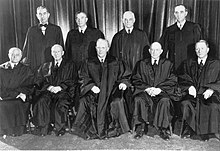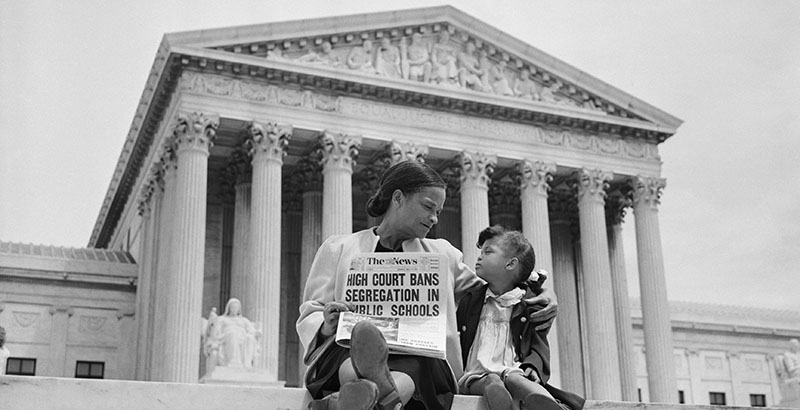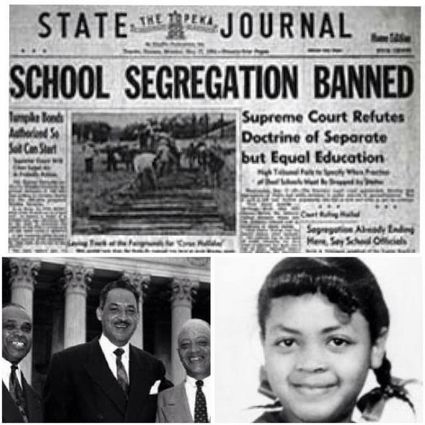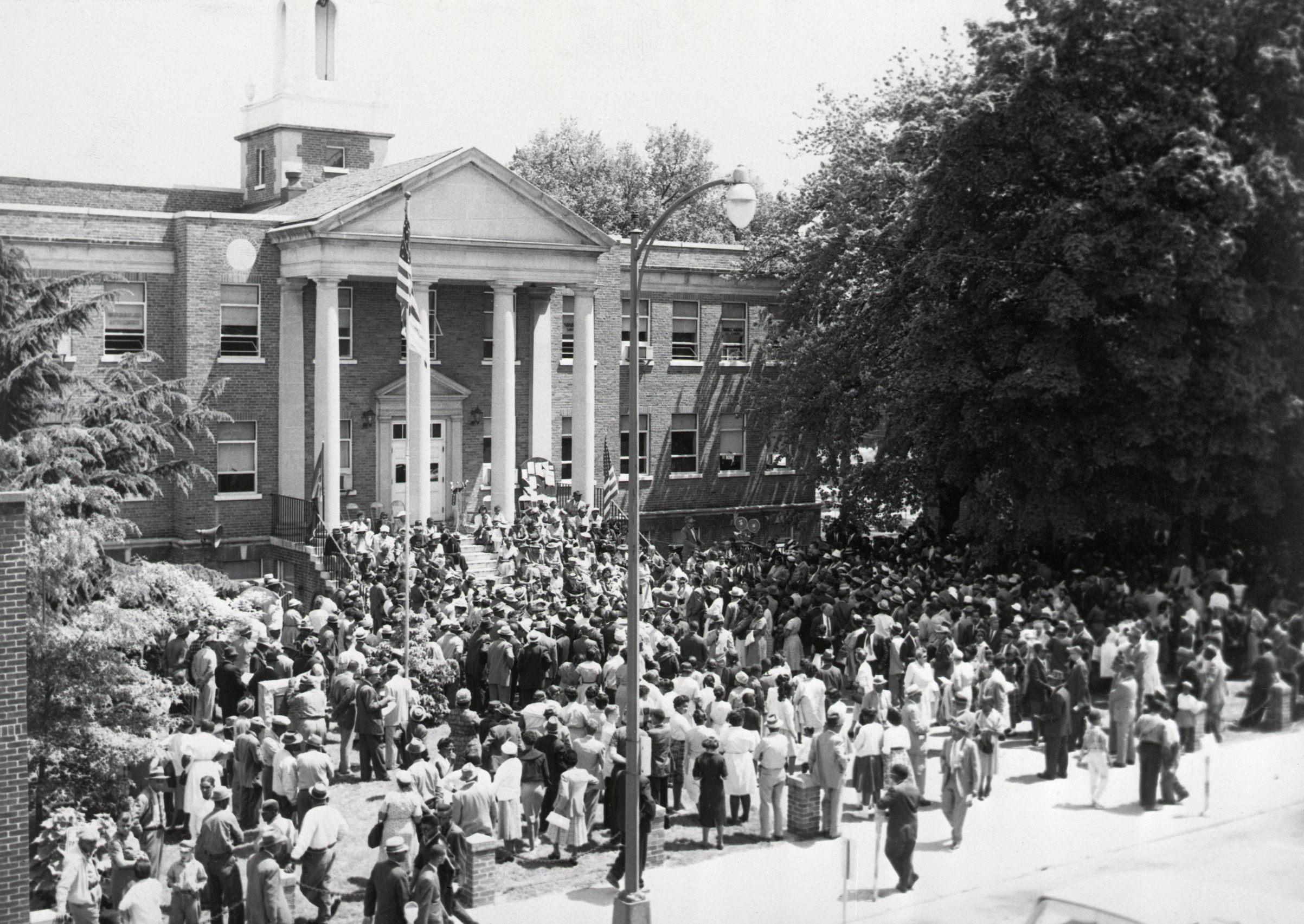Supreme Court Brown v. Board of Education was filed against the Topeka Kansas school board by representative-plaintiff Oliver Brown parent.
 Brown V Board Of Education Wikipedia
Brown V Board Of Education Wikipedia
One of these class actions Brown v.

Supreme court brown vs board of education. FOR THE DISTRICT OF KANSAS. Argued December 9 1952. On May 17 1954 US.
Board of Education the plaintiffs are Negro children of elementary school age residing in Topeka. Board of Education the plaintiffs are Negro children of elementary school age residing in Topeka. Board of Education of Topeka Kansas.
State-sanctioned segregation of public schools was a violation of the 14th Amendment and was therefore unconstitutional. Board of Education of 1954 legally ended decades of racial segregation in Americas public schools. Board of Education of Topeka Kansas.
The Supreme Courts historical rejection of the segregation in Southern schools. The Supreme Courts opinion in Brown v. Board of Education of Topeka 347 US.
Board of Education of Topeka. Reargued December 8 1953. The court ruling combined these five cases under the heading Oliver L.
Decided May 17 1954 APPEAL FROM THE UNITED STATES DISTRICT COURT. The Supreme Courts ruling in Brown overruled Plessy v. 483 1954 Brown v.
Board of Education of Topeka. Brown was the assigned lead plaintiff in the Kansas class action suit and became namesake of the court decision. Decided October 8 1952 344 US.
Ferguson by holding that the separate but equal doctrine was unconstitutional for American educational facilities and public schools. Board of Education 344 US. Board of Education of Topeka was a landmark 1954 Supreme Court case in which the justices ruled unanimously that racial segregation of children in public schools was unconstitutional.
Linda Brown and her family believed that the segregated school system violated the 14th Amendment and took their case to court. Supreme Court Justice Earl Warren delivered the unanimous ruling in the landmark civil rights case Brown v. Board of Education of Topeka KS the landmark case was actually five cases that the Supreme Court.
They brought this action in the United States District Court for the District of Kansas to enjoin enforcement of a Kansas statute which permits but does not require cities of more than 15000 population to maintain. Supreme Court Brown v. In the Kansas case Brown v.
The federal District Court decided that segregation in public education was harmful to Black children but the segregation was legal because all-Black schools and all-White schools had similar buildings transportation. In two cases set for argument in October laws of Kansas and South Carolina providing for racial segregation in public schools were challenged as violative of the Fourteenth Amendment. The Board of Education of Topeka KS et.
Originally named after Oliver Brown the first of many plaintiffs listed in the lower court case of Brown v. This decision led to more integration in other areas and was seen as major victory for the Civil Rights Movement. 1 1952 Brown v.
CHIEF JUSTICE WARREN delivered the opinion of the Court. Footnote 1 In the Kansas case Brown v.
 65 Years After Supreme Court S Historic Brown V Board Of Education Ruling We Are Right Back Where We Started The Washington Post
65 Years After Supreme Court S Historic Brown V Board Of Education Ruling We Are Right Back Where We Started The Washington Post
The Brown V Board Of Education Of Topeka Trial A Chronology
 65th Anniversary Of Brown Vs Board Of Education
65th Anniversary Of Brown Vs Board Of Education
 Lawyers Committee For Civil Rights Under Law Recognizes 65 Year Anniversary Of Brown V Board Of Education Supreme Court Ruling Lawyers Committee For Civil Rights Under Law
Lawyers Committee For Civil Rights Under Law Recognizes 65 Year Anniversary Of Brown V Board Of Education Supreme Court Ruling Lawyers Committee For Civil Rights Under Law
 The Untold Stories Behind Brown V Board 65 Years Later Remembering The Five Unique Lawsuits And Communities That Joined Forces To Persuade The Supreme Court The 74
The Untold Stories Behind Brown V Board 65 Years Later Remembering The Five Unique Lawsuits And Communities That Joined Forces To Persuade The Supreme Court The 74
 Brown V Board Of Education Of Topeka Definition Facts Significance Britannica
Brown V Board Of Education Of Topeka Definition Facts Significance Britannica
 The Us Supreme Court Hands Down Brown V Board Ii Decision On May 31 1955 Little Rock Culture Vulture
The Us Supreme Court Hands Down Brown V Board Ii Decision On May 31 1955 Little Rock Culture Vulture
 The Legacy Of Brown V Board Of Education Telegram
The Legacy Of Brown V Board Of Education Telegram
 Brown V Board Of Ed Anniversary Protecting A Court Decision Time
Brown V Board Of Ed Anniversary Protecting A Court Decision Time